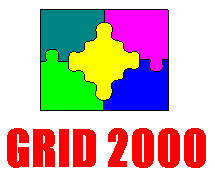

Co-sponsored by the IEEE Computer Society and ACM SIGARCH
In Co-operation with the IEEE Task Force on Cluster Computing, EuroTools SIG on Metacomputing and European Grid Forum
Contributions/Support from:
Microsoft Research, USA
Centre for Development of Advanced Computing, India
Genias Software/Gridware Inc., Germany
The growing popularity of the Internet along with the availability of powerful computers and high-speed networks as low-cost commodity components is changing the way we do computing. This technology opportunity enables the clustering of a wide variety of geographically distributed resources such as supercomputers, storage systems, data sources, and special classes of devices, and allows them to be used as a single unified resource and thus forms what is popularly known as “computational grids”. The computational grid is analogous to power (electricity) grid and aims to couple geographically distributed resources and offer consistent and inexpensive access to resources irrespective of their physical location or access point.
GRID2000 is an international meeting that brings together international grid computing researchers, developers, practitioners, and users. The aim of GRID2000 is to serve as a forum to present current and future work as well as to exchange research ideas in this field.
Scope
GRID2000 will emphasize both the design, analysis, implementation, and deployment of grid computing environments and applications as well as their use in scientific, engineering, and commercial settings. The topics of interest include, but are not limited to:
- Grid Fabrics and Architectures
- Grid Middleware and Toolkits
- Resource Management and Scheduling
- Grid Information Services
- Grid Security Issues
- Advance Resource Reservation and Scheduling
- Remote Data Access and Management
- Grid Management and Organization Tools
- Issues in integrating Clusters into Grid environment
- Programming Models, Tools, and Environments
- Performance Evaluation and Modelling of Gird Systems
- Internet-based Computing Models
- Collaborative Engineering Environments
- Grid Applications (scientific, engineering, and business)
- Information Power Grid
- Computational Economy
- Social, Scientific, and Industrial Implications of Computational Grids
The paper should not exceed 12 single-spaced pages of text using 10 point size type on A4 pages. Electronic submission by email is strongly encouraged. Authors should submit a PostScript (level 2) or PDF file that will print on a PostScript printer using A4 size paper. To facilitate processing, each submission should also enclose the following information in ASCII format: paper title, author name, abstract, up to five keywords, as well as the contacting information of the responsible author (postal address, e-mail address, phone/fax numbers). The results presented in the paper must be original. Submission implies the willingness of at least one of the authors to register and present the paper. Hard copies should be sent only if electronic submission is not possible. Please send full paper for consideration to any one of the Workshop Co-Chairs. The hard copy submissions can be mailed, however, electronic submission is strongly encouraged.
GRID 2000 also encourages the submission of outstanding "work-in-progress" type research note, however, the size of such papers is restricted to 5 pages. If the "reserach note" is rich in technical contents, we can relax this restriction.
Mark Baker
School of Computer Science
University of Portsmouth,
c/o Milton Campus,
Southsea, Hants, UK
Tel: +44 1705 844285
Fax: +44 1705 844006
E-mail: Mark.Baker@port.ac.uk
WWW: http://www.dcs.port.ac.uk/~mab/